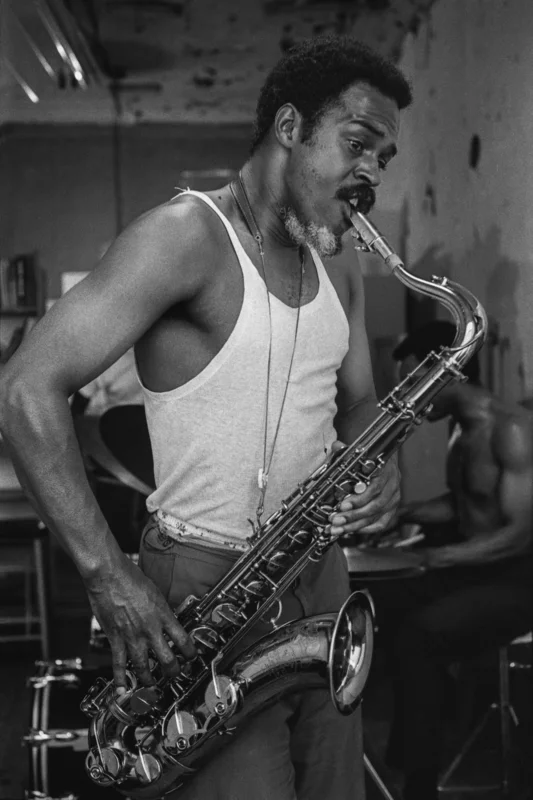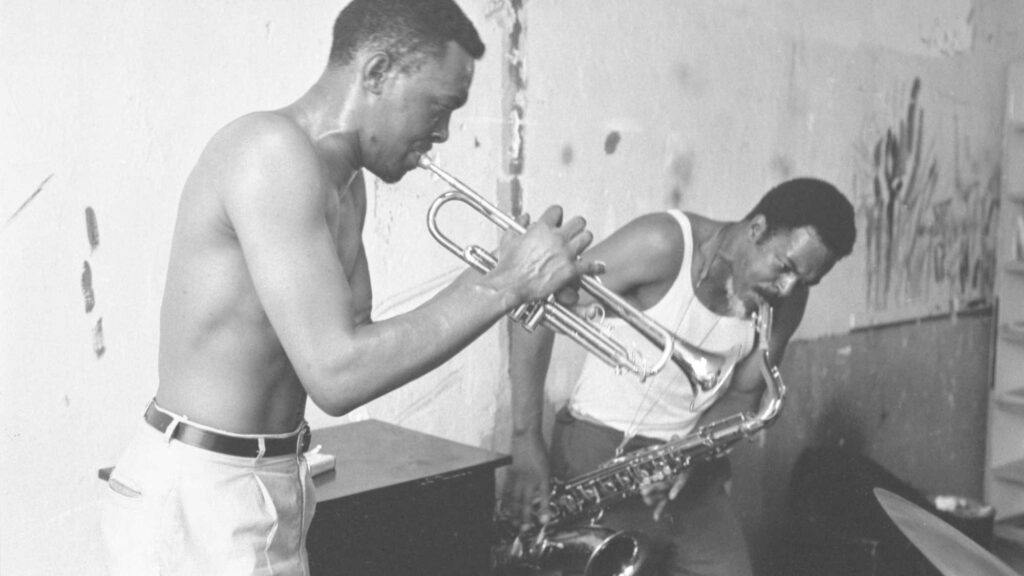If it’s true a picture is worth a thousand words, this particular image seems able to conjure up entire books, libraries filled with stories of pain and pathos, apathy and expression, rejection and redemption.
This is a picture that conveys a simple fact: these musicians—and those of their ilk, particularly during the mid-to-late ‘60s—were not spoiled or self-indulgent, they weren’t building their brands or focused on how to market their art; they were dead serious, fully invested, and they left every bit of energy and exaltation on the records they made. That these recordings were not easily accessible is an understatement. Indeed, they were anti-commercial almost to an aggressive degree, but such is the way with prophets, their messages often ignored or ill-received.
Albert Ayler led an extraordinary, sad, inspiring, ultimately tragic life (read much more about him here).
You are either the type of person who hears a recording like “Angels,” recorded live at the Village Vanguard in 1966, and recognizes something extraordinary, something other is unfolding, or you aren’t. It’s that simple. But…it isn’t. Some of us must at least attempt to pay it forward and see if any lost souls might be converted, might be brought into the light. Because you listen to “Angels,” or “Truth is Marching In,” or “Spirits Rejoice,” and recognize that something significant is happening, something that was meant to be shared. Ayler titled one of his final albums Music is the Healing Force of the Universe, and he wasn’t joking. You may be the type that scoffs at such words or sentiment; you certainly would not be alone.
It’s a fact that creativity needs to connect (with the creator, with those it’s made to reach) and that relationship is personal. Art always has to account for itself. Still, for certain types of art, and certain types of artists, it’s essential for those left behind to bear witness; those who have been moved or inspired or possibly saved. It seems the least we can do.
Thanks again to the fantastic team at The Decolonial Passage for publishing my poetry, and it’s once again an honor to appear in their pages (here are previous poems about Pharoah Sanders, Howlin’ Wolf, and Billie Holiday).
Albert Ayler’s Vision*
Would-be angels, rejected or returned
to earth, ever eager to share their secrets—
which, suspiciously, all sound the same—
tend to talk about that white light
we’ll all stride toward, transitioning
from here to there, the strangeness
of dead lovers and famous names
(now friends) guiding them forward,
into some impossibly bright beacon.
And why does it always have to be white?
A white god with a white beard dressed
in white (never mind the poor souls
taught to run the other way whenever
they saw men in white robes), looking
like a slick car salesman saying No way
I can make a better deal on this trade-in.
Or consider the revelation of Malcolm X,
reading the dictionary from start to finish
as he bided time in the purgatory of prison,
unlearning what it takes to stay on the right
side of iron bars, figuring out as he did why
they say those who win write our history,
and why white makes right and the wrong
people get blackballed—according to a code
baked into words by the white pie in the sky:
a place where all will be revealed, baptizing
non-believers with the light of white, hot fire.
What did Albert Ayler see when he wept
into the East River, that night he disappeared
forever, having been driven more than halfway
to distraction by the voices that wouldn’t stop,
and why didn’t the Lamb of God put bread inside
his basket when he played the ecstasy of saints
marching in? Did he see a reflection—of himself
or the absent savior who died for his sins—or else
the void of all color & sound as a weary moon hid
behind the clouds (holy ghosts keeping off the record),
unwilling to witness one more force majeure
amongst martyrs, the Devil, and the deep blue sea?
(*Avant-garde saxophonist Albert Ayler made albums at once decidedly—even provocatively—non-commercial, yet deeply spiritual and ecstatic, and like many other jazz musicians, despite being critically acclaimed, he ceaselessly struggled to make a living. In 1969 he wrote an open letter describing his apocalyptic visions and, after being asked why he was wearing a fur coat with his face covered in Vaseline in the summer heat, replied “Got to protect myself.” Ayler was found dead in New York City’s East River on November 25, 1970, a presumed suicide.)


